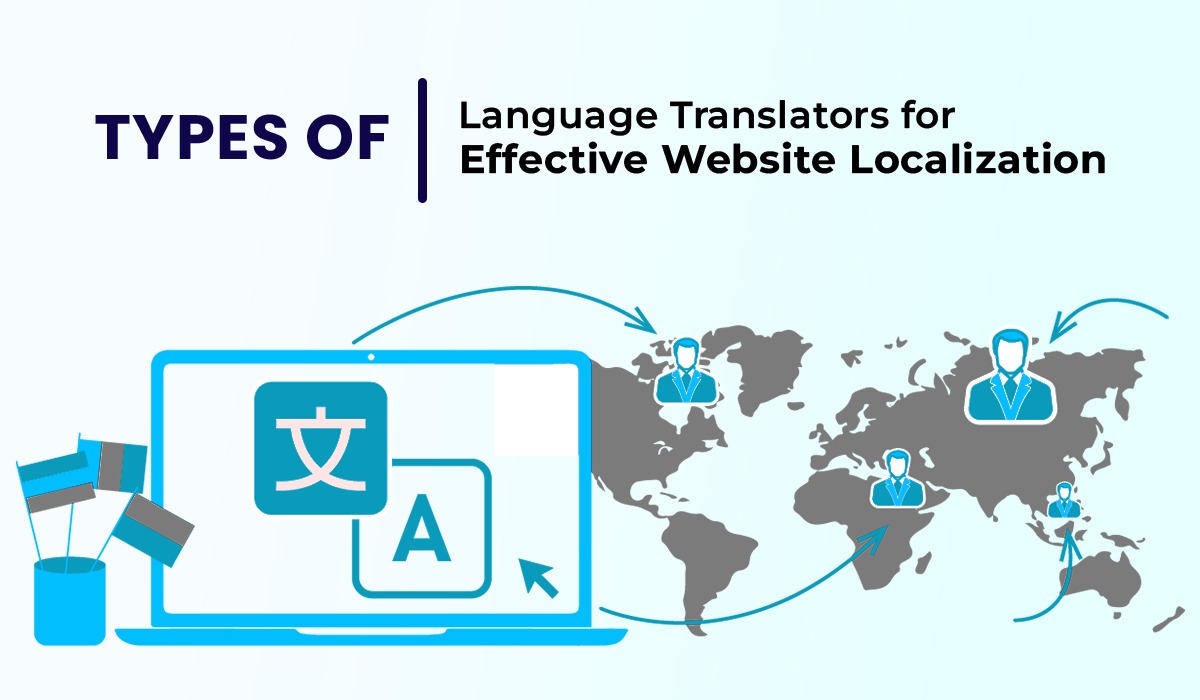In today’s globalized digital landscape, website localization is no longer just an option—it’s a necessity. For eCommerce and Banking business, reaching a diverse audience across linguistic and cultural boundaries is critical to success. But with various translator and its types available, how do you choose the right one for your business? This blog will break down the types of language translators, focusing on how they can help you achieve wider reach, greater online conversions, better engagement, and improved user interaction.
How Do Different Types of Language Translators Impact Website Localization?
When it comes to website localization, not all translation methods are created equal. The choice of translator can significantly impact how your content resonates with your target audience. Here are the three main types of language translators you should consider:
- Human Translators: Traditionally, human translators have been the gold standard for localization. They offer nuanced translations that account for cultural context, idiomatic expressions, and industry-specific jargon. However, they can be costly and time-consuming, especially when dealing with large volumes of content.
- Rule-Based Machine Translation (RBMT): This early form of machine translation relies on grammatical rules and dictionaries. While RBMT can handle structured content fairly well, it struggles with context and nuance, often leading to translations that are rigid or awkward. It’s generally not ideal for dynamic websites with diverse content.
- Neural Machine Translation (NMT): NMT, the most advanced form of machine translation, uses deep learning algorithms to produce translations that are remarkably accurate and contextually appropriate. Reverie’s Translation API is an excellent example of NMT technology that can scale across multiple languages, making it a strong contender for businesses aiming for a seamless global presence.
Which Translation Method Offers the Best Balance Between Accuracy and Cost for My Business?
Accuracy and cost are always at the forefront of decision-making for Digital Marketing experts. While human translators offer high accuracy, their costs can be prohibitive. On the other hand, RBMT is cost-effective but often lacks the contextual accuracy needed for effective localization.
This is where NMT shines. NMT technology, like Reverie’s Translation API, offers a balanced approach by delivering high-quality translations at a fraction of the cost of human translators. It’s particularly advantageous for businesses in eCommerce and Banking, where maintaining accuracy across different languages is crucial, yet operational costs must remain manageable.
How Can Neural Machine Translation (NMT) Improve Online User Engagement and Conversions?
For businesses in competitive sectors like eCommerce and Banking, user engagement and conversions are key performance indicators (KPIs). A poorly localized website can turn potential customers away, while a well-localized one can significantly improve user engagement and boost conversions.
NMT can transform how users interact with your website by offering translations that feel natural and intuitive. The deep learning algorithms behind NMT can understand and translate content with context, ensuring that your messaging remains compelling across different languages. This can lead to higher user satisfaction, reduced bounce rates, and, ultimately, better conversion rates.
What Are the Key Considerations When Choosing a Language Translator for Website Localization?
Choosing the right translation method for your website isn’t just about cost and accuracy; it’s also about understanding your audience and the complexity of your content. For instance, eCommerce websites with a wide range of products will benefit from NMT’s ability to handle diverse content types. In contrast, Banking websites, which often contain specialized terminology, might need a translator that can ensure precise and contextually appropriate translations.
Other factors to consider include the ease of integration with your existing systems and the scalability of the solution. NMT APIs, like Reverie’s, can be seamlessly integrated into your website, allowing for real-time updates and a scalable approach as your business grows.
How Does Language Translation Affect SEO and Online Visibility?
SEO is a critical aspect of digital marketing, and language translation plays a significant role in it. Search engines prioritize websites that offer relevant content to users in their native languages. By using a robust translation method, like NMT, you can ensure that your localized content is not only accurate but also optimized for search engines.
Moreover, NMT can help you avoid common pitfalls like keyword stuffing or unnatural phrasing, which can hurt your SEO rankings. Proper localization with NMT can boost your website’s visibility in search results, driving more organic traffic and increasing your reach.
What Are the Benefits of Using a Specialized Translation API for eCommerce and Banking Websites?
For businesses in the eCommerce and Banking sectors, using a specialized translation API like Reverie’s can offer numerous benefits. These include faster time-to-market, as NMT allows for quick and accurate translations, and better customer satisfaction, as the translations are contextually relevant and easy to understand.
Moreover, an NMT API is scalable, meaning it can grow with your business, handling more languages and content types as needed. This flexibility ensures that as your business expands, your website localization efforts remain efficient and effective.
In conclusion, the right choice of language translator can make a significant difference in your website localization efforts. For businesses in the eCommerce and Banking sectors, where reaching a broader audience and improving online engagement is crucial, NMT offers a compelling balance between accuracy, cost, and scalability. By leveraging advanced solutions like Reverie’s Translation API, you can ensure that your website not only speaks the language of your audience but also resonates with their cultural and contextual nuances, driving better engagement and higher conversions.
FAQs
What are the different types of language translators available for website localization?
There are three main types of language translators: Human Translators, Rule-Based Machine Translation (RBMT), and Neural Machine Translation (NMT). Each type offers varying levels of accuracy, cost-effectiveness, and contextual understanding, making it essential to choose the right one based on your business needs.
How do I decide which type of language translator is best for my website?
The best type of translator for your website depends on several factors, including the complexity of your content, target audience, and budget. For instance, NMT (Neural Machine Translation) is ideal for businesses needing high accuracy and scalability, such as those in the eCommerce and Banking sectors.
What is Neural Machine Translation (NMT), and how does it differ from other types of translators?
Neural Machine Translation (NMT) uses deep learning algorithms to produce more accurate and contextually relevant translations compared to traditional methods like Rule-Based Machine Translation (RBMT). Reverie’s Translation API is an example of an NMT solution that offers high-quality translations suitable for various industries, including eCommerce and Banking.
Can using NMT improve my website's user engagement and conversions?
Yes, NMT can significantly enhance user engagement and conversions by providing translations that are natural, accurate, and contextually appropriate. This leads to a better user experience, reduced bounce rates, and higher conversion rates, especially for businesses in competitive sectors like eCommerce and Banking.
How does Reverie's Translation API compare to other translation solutions for website localization?
Reverie’s Translation API, powered by NMT, offers a robust solution for website localization. It provides high accuracy, scalability, and ease of integration, making it an excellent choice for businesses looking to localize content quickly and efficiently. It’s particularly beneficial for the eCommerce and Banking sectors, where precise and contextually relevant translations are crucial.


